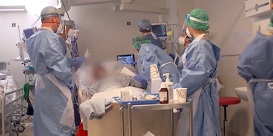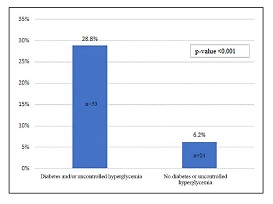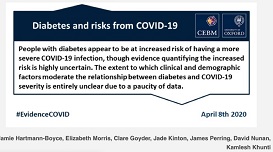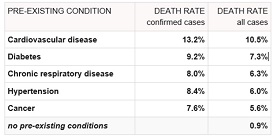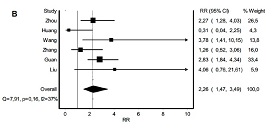|
ABCD COVID-19 & Diabetes: UK
national audit
COVID-19 and diabetes
Emerging data from the early stages of the COVID-19 pandemic identified
that people with diabetes and COVID-19 had an elevated risk of adverse
outcomes. The UK Government advice for people with diabetes was to stay
at home as much as possible and follow strict social distancing. Despite
these recommendations,
sadly almost a third of the people who died
during this pandemic in the UK had diabetes. Data from NHS England have
identified that
those with Type 1 and Type 2 diabetes have a 3.5- and 2-
fold increased risk of excess death, respectively.
Many unanswered questions about the impact
of COVID-19 on people with diabetes remain. ABCD has brought together a
working group who aim to explore this relationship in more detail,
through a national ABCD audit of those admitted with COVID-19 and
diabetes.
About the ABCD COVID-19 & diabetes
UK national audit
This audit aims to explore the clinical features and presentation of
people admitted with diabetes and COVID-19. Through capturing detailed
real-world data on the clinical presentation, co-morbidities, therapies
and outcomes we hope to gain better insight into the impact of COVID-19
on those living with diabetes. The audit has a number of
objectives.
Structure of the audit – centres and
sites
For this audit, the concept of centres and sites is utilised in the same
way as in the other ABCD audits. Typically, a centre is an NHS Trust.
Designated leaders of the local audit are given access to the anonymised
data of all the patients associated with the centre for more powerful
local analysis. Findings from local analysis can be put forward for
further testing on the full national dataset.
Identification of cases
Your trust will have a list of COVID-19 cases and may be able to
generate a list of those with COVID-19 who have also been coded as
having diabetes. If this is not possible your local pathology lab may be
able to help with identification of cases. Once you have a list of
cases, please allocate a number to each that will also be used in the
ABCD audit file. Then if you need to go back to the anonymised ABCD
excel file later you will be able to identify the case locally.
Collecting data
We are now past the first peak of COVID-19 and it is therefore likely
that most data collection will be retrospective. It is recommended that
data is collected on consecutive cases. Each centre registered for the
audit should aim to submit a minimum of 10 cases (there is no upper
limit). In centres which have started collecting data for the audit we
have found that junior doctors, registrars and medical students have
been keen to help collate data. Depending on the individual trust, in
some instances the data collection can be done using online records, in
some cases the physical notes will be required. Data collection for each
patient typically takes ~20-30 minutes.
Submitting data centrally
Anonymised data files can be securely transferred to Dr Rustam Rea and
team in Oxford via NHS email to
orh-tr.nihrhic@nhs.net. Email addresses that are not
NHS should not be used. The team in Oxford will lead on
analysis of the national data, guided by the working group. The data
submitted will remain within the NHS. The data submitted centrally will
be anonymised. No patient identifiable data should be submitted to
Oxford.
Non ABCD members
Non ABCD members are welcome to take part in the audit and will be given
access to the data collection tool when they register for the audit.
Register to take part in the audit
and access to the on-line tool
When you
register for the audit, the team will send you the Excel file for
data collection.
Caldicott Guardian approval and
information governance
The ABCD nationwide audit programme has Caldicott Guardian approval. The
programme is audit not research. The NHS encourages audit of clinical
practice and there are strict guidelines which we follow, we only to
collect data from routine clinical practice, and analysis is of
anonymised data. The data will be sent to Oxford University
Hospitals NHS Foundation Trust (OUH) which will host the anonymised data
within a secure NHS haven. The Audit has been registered with OUH and a
Data Protection Impact Assessment has been completed and signed by the
Caldicott Guardian of OUH. Further information regarding Information
Governance can be obtained by emailing
orh-tr.nihrhic@nhs.net.
Data analysis and dissemination
The audit team will email you with dates for data submission with a
countdown to submission at regular intervals. Data collection and
analysis will be a rolling process. The findings form the analysis will
be disseminated widely through national and international conferences
and publications. Those who submit data will be acknowledged in the
publications. Those who submit the largest data sets shall also be
invited to be abstract and paper co-authors.
Further
information
Further enquiries may be made to the ABCD nationwide audits
database administrator of the project,
Melissa Cull
ABCD COVID-19 & Diabetes national audit team
Dr Rustam Rea
Prof Kamlesh Khunti
Prof Sarah Wild
Dr Bob Ryder
Dr Emma Wilmot
Dr Ben Field
Dr Parth Narendran
Dr Rajev Ghandi
Dr Sophie Harris
Dr Dinesh Nagi
|


